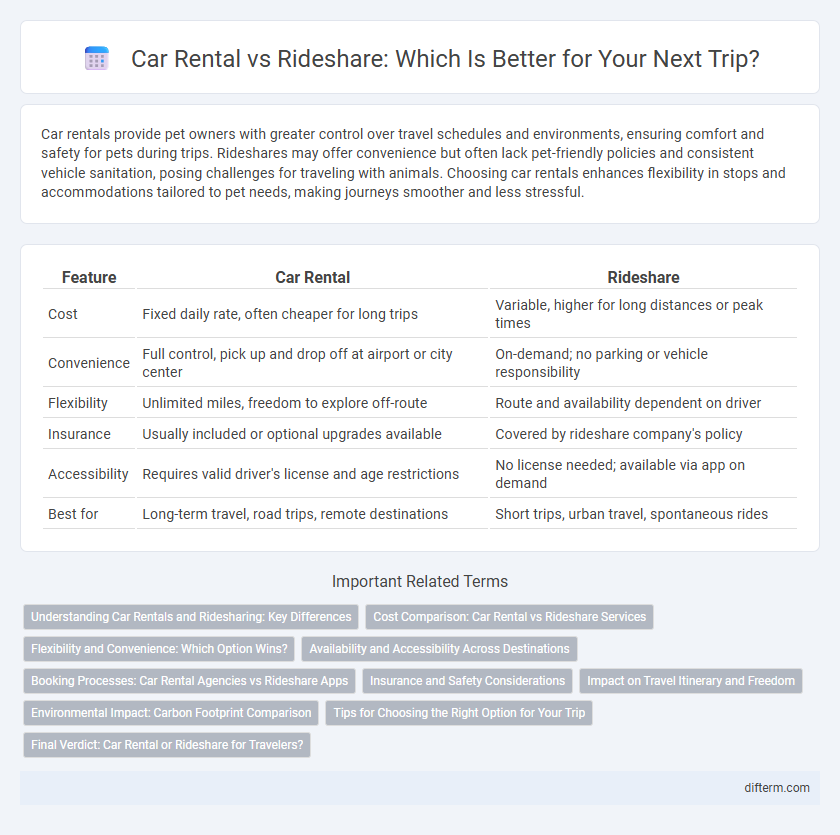Car rentals provide pet owners with greater control over travel schedules and environments, ensuring comfort and safety for pets during trips. Rideshares may offer convenience but often lack pet-friendly policies and consistent vehicle sanitation, posing challenges for traveling with animals. Choosing car rentals enhances flexibility in stops and accommodations tailored to pet needs, making journeys smoother and less stressful.
Table of Comparison
| Feature | Car Rental | Rideshare |
|---|---|---|
| Cost | Fixed daily rate, often cheaper for long trips | Variable, higher for long distances or peak times |
| Convenience | Full control, pick up and drop off at airport or city center | On-demand; no parking or vehicle responsibility |
| Flexibility | Unlimited miles, freedom to explore off-route | Route and availability dependent on driver |
| Insurance | Usually included or optional upgrades available | Covered by rideshare company's policy |
| Accessibility | Requires valid driver's license and age restrictions | No license needed; available via app on demand |
| Best for | Long-term travel, road trips, remote destinations | Short trips, urban travel, spontaneous rides |
Understanding Car Rentals and Ridesharing: Key Differences
Car rentals offer travelers full vehicle control, ideal for long trips, multiple stops, and flexible schedules, often with options like insurance and vehicle type choices. Ridesharing services provide on-demand transportation without the responsibilities of driving or parking, suitable for short distances or urban travel, leveraging smartphone apps for convenience. Pricing structures differ significantly: car rentals usually involve daily rates with mileage limits, while ridesharing costs vary by distance, time, and demand surges.
Cost Comparison: Car Rental vs Rideshare Services
Car rental services typically offer lower daily rates for extended trips, averaging $40 to $70 per day, while rideshare rides cost around $2 to $3 per mile, which can become expensive for long distances. Hidden fees in car rentals, such as insurance and fuel charges, may increase total expenses, whereas rideshare services include surge pricing during peak hours, driving up costs unpredictably. Travelers should evaluate trip length and convenience, as rentals provide fixed costs for longer use, while rideshares may be more economical for short, occasional travel.
Flexibility and Convenience: Which Option Wins?
Car rental offers unmatched flexibility by allowing travelers to explore destinations at their own pace without waiting for availability or ride requests, ideal for spontaneous detours and remote locations. Rideshare services provide convenience through app-based booking, eliminating the need for parking and navigation stress, making them perfect for urban trips and short-distance travel. Choosing between car rental and rideshare depends largely on the traveler's itinerary, with rentals excelling in autonomy and rideshares in ease of use.
Availability and Accessibility Across Destinations
Car rental services offer widespread availability in urban centers and major airports, providing travelers with the flexibility to explore diverse destinations at their own pace. Rideshare platforms, while abundant in large cities, may have limited presence in rural or remote areas, reducing accessibility for travelers in those regions. Travelers seeking reliable transportation across a variety of locations often find car rentals more accessible in off-the-beaten-path destinations.
Booking Processes: Car Rental Agencies vs Rideshare Apps
Car rental agencies require advance booking through websites or phone calls, often involving credit checks and identity verification, whereas rideshare apps enable instant booking via mobile platforms with minimal upfront requirements. Car rentals provide fixed rates based on duration and vehicle type, while rideshares use dynamic pricing influenced by demand and distance. The streamlined app interface of rideshare services contrasts with the more formal reservation process typical of traditional car rental companies.
Insurance and Safety Considerations
Car rental offers comprehensive insurance options, including collision damage waiver and liability coverage, which provide greater financial protection in case of accidents compared to rideshare services. Rideshare insurance typically covers only the driver during active trips, leaving passengers responsible for personal injury or property damage outside of these periods. Prioritizing car rental insurance and vehicle safety features can reduce risks and enhance traveler security during trips.
Impact on Travel Itinerary and Freedom
Car rental offers travelers complete control over their itinerary, enabling spontaneous stops and route changes without relying on drivers' availability. Rideshare services provide convenience but can limit flexibility due to wait times and geographic coverage constraints. Travelers seeking unlimited freedom and customized schedules often prefer car rentals for their autonomy.
Environmental Impact: Carbon Footprint Comparison
Car rental often results in a lower carbon footprint compared to rideshare services due to the ability to choose fuel-efficient or electric vehicles and avoid multiple short trips. Rideshare trips contribute to higher emissions per passenger mile because of deadheading, where drivers travel without passengers between rides. Selecting eco-friendly car rental options significantly reduces overall environmental impact during travel.
Tips for Choosing the Right Option for Your Trip
Evaluate your travel itinerary and duration to determine whether car rental or rideshare offers better cost efficiency and convenience. Consider factors such as local traffic patterns, parking availability, and flexibility in exploring off-the-beaten-path destinations. Research pricing, insurance coverage, and vehicle options to select the best fit for your trip's specific needs and budget.
Final Verdict: Car Rental or Rideshare for Travelers?
Car rental offers travelers greater flexibility, control over schedules, and cost-effectiveness for longer trips or multiple destinations, while rideshare services excel in convenience, eliminating the need for parking and navigation in urban areas. The choice depends on itinerary complexity, budget constraints, and personal preference for autonomy versus ease. For extended stays or exploring remote locations, car rentals typically provide better value, whereas rideshares suit short trips within congested cities.
car rental vs rideshare Infographic

 difterm.com
difterm.com